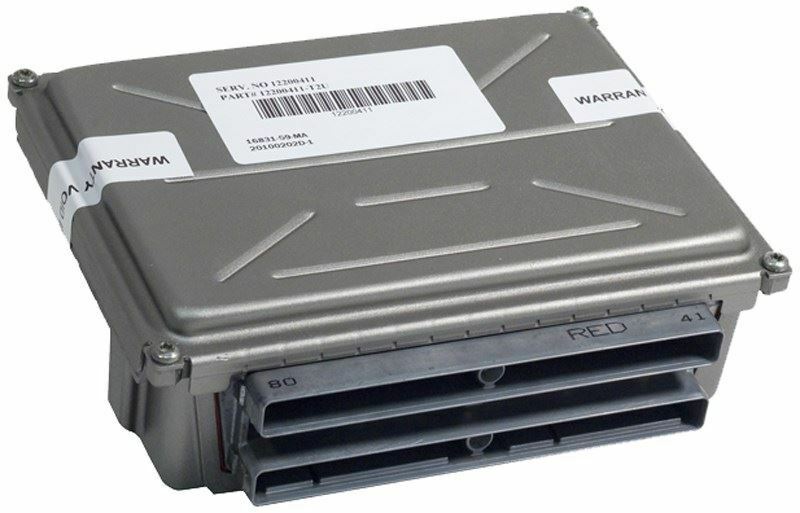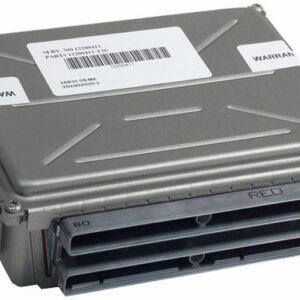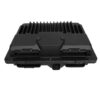Restore Peak Performance to Your GM Vehicle
If you’re dealing with frustrating engine problems in your late-90s GM car—like a persistent check engine light, erratic idling, or a no-start condition that leaves you stranded—the culprit is often the Powertrain Control Module (PCM). As the brain of your vehicle, when the PCM starts to fail, it can cause a cascade of confusing issues. Over my 20+ years in automotive diagnostics, I’ve seen countless vehicles from this era, particularly those with the workhorse 3.1L, 3.4L, and 3.8L V6 engines, suffer from PCM failure due to age, heat, and vibration causing internal components to break down.
This isn’t just another part; it’s a direct-fit, reliable solution. We take the guesswork and extra expense out of the equation. Before this module ships, we program it with the latest official GM software updates, specifically matched to your car’s Vehicle Identification Number (VIN). This means it arrives at your door ready for installation, with no need for a costly trip to the dealership for programming. This is the most effective way to restore your vehicle’s original drivability, fuel efficiency, and emissions compliance.
Case Study: A Tricky Diagnosis
I remember a 1998 Buick LeSabre with the 3.8L engine that came into the shop with an intermittent stalling problem that was driving the owner crazy. It would only happen after driving for 30+ minutes on a hot day. Other shops had replaced the fuel pump and ignition module, but the problem persisted. After hooking up my scan tool and monitoring live data, I noticed the PCM was commanding the fuel injectors to shut off randomly when the engine bay got hot. It was a classic case of heat soak affecting the module’s internal circuits. We replaced the PCM with a VIN-programmed unit like this one, and the car ran perfectly, proving that sometimes the most complex problems have a straightforward solution.
Common Signs of a Failing PCM
If your vehicle is showing these symptoms, a faulty PCM could be the reason. A failing module can often trigger diagnostic trouble codes (DTCs) such as P0601, P0602, P0605, or other communication errors.
- ✔ Check Engine Light is on with no clear cause
- ✔ Engine stalls, stumbles, or misfires
- ✔ Vehicle won’t start, or is very difficult to start
- ✔ Poor fuel economy
- ✔ Harsh or erratic automatic transmission shifting
- ✔ Failure to pass an emissions test
- ✔ Communication errors with a scan tool
A Straightforward Guide to Installation
Replacing your PCM is a job most DIYers can handle with basic tools. Following these steps will help ensure a smooth installation.
- Safety First: Always disconnect the negative terminal from your vehicle’s battery and wait about 10 minutes to ensure all systems are powered down.
- Locate the PCM: On these GM models, the PCM is typically found in the engine compartment, often inside the air filter housing, or under the dashboard on the passenger side.
- Disconnect the Harnesses: Carefully release the locking tabs on the electrical connectors and pull them straight out from the module. Avoid pulling on the wires themselves.
- Remove the Old Module: Unbolt the PCM from its mounting bracket. Note the orientation of the old module before removing it.
- Install the New Module: Mount the new, pre-programmed PCM in the same position and secure it with the original bolts.
- Reconnect Everything: Firmly plug the electrical harnesses back into the new PCM until they click into place. Reconnect the negative battery terminal.
- Final Steps: Your vehicle may need to complete a security relearn procedure, which typically involves turning the key to the ‘ON’ position for 10-15 minutes. Check your owner’s manual for specific instructions. Start the vehicle and let it idle to confirm proper operation.
Verified Vehicle Compatibility
This Powertrain Control Module is a direct replacement for the original unit in a wide range of 1998 and 1999 General Motors vehicles. Please verify your specific model and engine below. This part is compatible with service numbers: 09356741, 16236757, 9357034, 9357440, and 9366314.
ALERO 99 (3.4L)
BONNEVILLE 98
CAMARO 98 (3.8L)
CENTURY 98 (3.1L)
CUTLASS 98-99
EIGHTY EIGHT 98
FIREBIRD 98 (3.8L)
GRAND AM 98-99 (3.1L, 3.4L)
GRAND PRIX 98
INTRIGUE 98
LESABRE 98 (3.8L)
LUMINA CAR 98
MALIBU 98 (3.1L)
MONTE CARLO 98
PARK AVENUE 98 (3.8L)
REGAL 98
RIVIERA 98 (3.8L)
SILHOUETTE 98
SKYLARK 98 (3.1L)
TRANS SPORT 98
VENTURE 98 (3.4L)
Frequently Asked Questions
Frequently Asked Questions
How do I provide my VIN for programming?
After you complete your purchase, simply send us a message with your 17-digit Vehicle Identification Number (VIN). We will program the module before shipping it to you.
Is any additional programming needed after installation?
No. Because we program the module to your VIN, it is ready to install out of the box. In some cases, a simple security relearn or crankshaft position sensor relearn may be required, which can often be done without special tools.
Will this fix my transmission shifting problems?
In many cases, yes. The PCM controls both engine and transmission functions. If the module is faulty, it can cause poor shift quality, delayed engagement, or incorrect shifting. This part can resolve those issues if the PCM is the root cause.
Where is the VIN located on my vehicle?
Your VIN can be found on a metal plate on the driver’s side of the dashboard (visible through the windshield), on the driver’s side door jamb sticker, and on your vehicle’s registration and insurance documents.
What is the difference between an ECM, PCM, and ECU?
These terms are often used interchangeably. ECU (Electronic Control Unit) is a general term. ECM (Engine Control Module) specifically controls the engine. A PCM (Powertrain Control Module) is an integrated unit that controls both the engine and the transmission, which is what these GM vehicles use.



